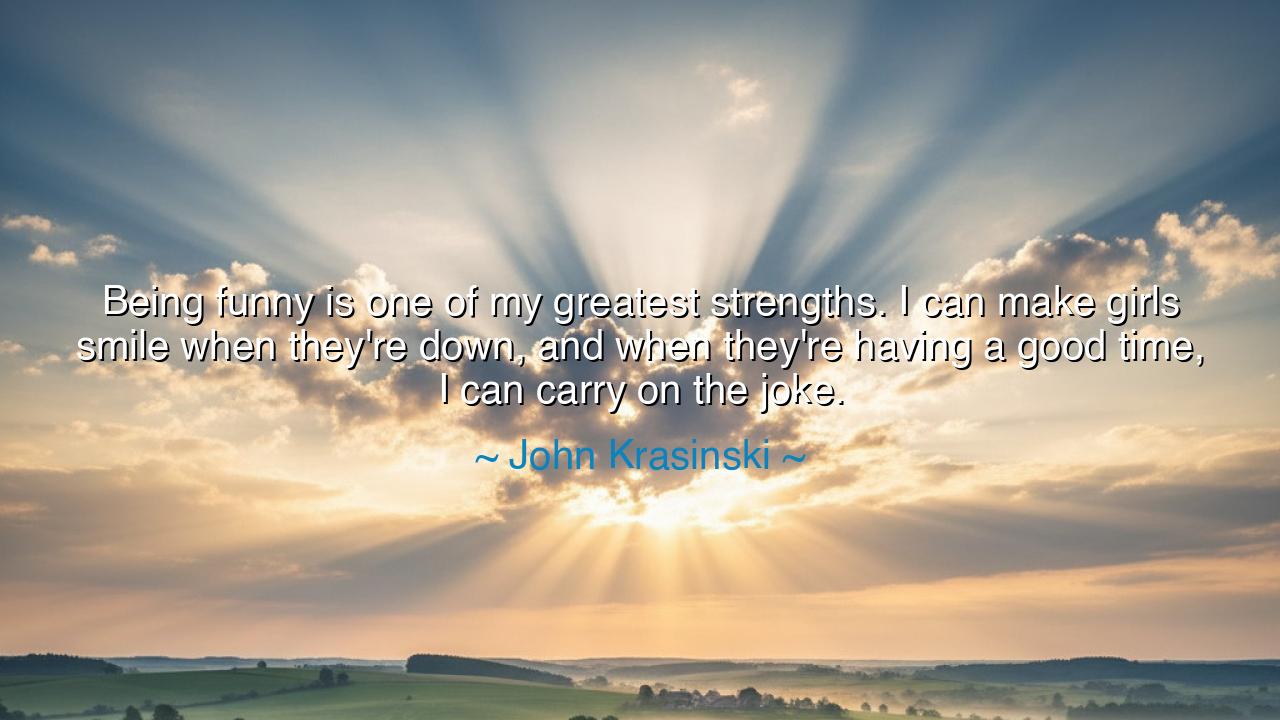
Being funny is one of my greatest strengths. I can make girls
Being funny is one of my greatest strengths. I can make girls smile when they're down, and when they're having a good time, I can carry on the joke.






“Being funny is one of my greatest strengths. I can make girls smile when they’re down, and when they’re having a good time, I can carry on the joke.” — thus spoke John Krasinski, the actor whose humor became a symbol of warmth, sincerity, and charm. In this reflection, there is more than modest jest; there is wisdom hidden beneath the laughter. For humor, though often taken lightly, is one of humanity’s oldest and most sacred gifts — a bridge between sorrow and joy, a healing force that binds souls together. Krasinski, in naming being funny as his strength, reminds us that laughter is not merely entertainment, but a form of kindness, a quiet art that turns darkness into light.
When Krasinski says, “I can make girls smile when they’re down,” he speaks of compassion disguised in comedy. The ancients knew that to lift the heart of another is a holy act. The Greek philosopher Democritus, often called “the laughing philosopher,” believed that joy is the soul’s natural state and that laughter restores balance to the weary mind. To make another smile, especially in moments of sadness, is to perform a small miracle — to remind them that life, though heavy, still holds sweetness. In laughter, we glimpse eternity’s gentleness, for joy shared is joy multiplied. Krasinski’s humor is not boastful but tender; it springs from empathy, not ego.
The second part of his reflection — “and when they’re having a good time, I can carry on the joke” — reveals another layer of wisdom. True humor is not disruption but harmony; it flows with the rhythm of the moment. To “carry on the joke” is to sustain the spirit of joy, to become a guardian of lightness. The ancients revered this balance. In their symposia, gatherings of food, music, and laughter, philosophers like Socrates and Aristophanes taught that humor, when used well, was a form of wisdom — a way to teach without preaching, to connect without control. It is no small strength to know when to speak, when to jest, and when to simply let laughter breathe.
In this light, Krasinski’s gift is more than charm — it is a modern echo of an ancient virtue. To be funny in its truest form is to be attuned to others, to sense their pain, their silence, their need for light. The ancients would have called this eunoia — “beautiful thinking” or goodwill toward others. A jest spoken in cruelty wounds; a jest spoken in love heals. The wise comedian, like the healer or philosopher, must know the measure of the heart. Krasinski’s laughter, rooted in empathy, reflects the ideal of philia — the love of friendship that nurtures the human spirit.
Consider the story of Diogenes, the Cynic philosopher who lived in a barrel and mocked kings and scholars alike. His humor was biting, yet born of truth. When Alexander the Great visited him and asked if he could grant any wish, Diogenes simply replied, “Yes — stand out of my sunlight.” The laughter that followed was not mockery but awakening; even Alexander, conqueror of nations, was humbled by the man who needed nothing. So too does true humor reveal what is essential — it strips away pretense, it comforts, and it frees. In Krasinski’s lighthearted confession lies this same essence: the power of laughter to connect, to disarm, and to remind us that humility and joy walk hand in hand.
Yet, in his tone, there is also a subtle awareness of how strength can be gentle. The ancients often celebrated warriors of body and mind, but they also praised those who fought for joy. Heraclitus once wrote that “character is destiny,” and perhaps Krasinski’s laughter — genuine, kind, and inclusive — is his destiny. For to make others laugh without diminishing them is an act of nobility. Humor that uplifts is a sign of moral strength, for it requires both wisdom and restraint.
So let this teaching be passed down: To be funny is to be merciful. Use laughter not as a weapon, but as a lantern. When others are low, offer them light; when the room is bright, help it stay so. Do not seek laughter for your own glory, but as a gift to others. Remember that humor, when guided by kindness, has the power to heal more than speeches or sermons ever could. As John Krasinski reminds us, being funny is not merely a talent — it is a virtue, a reflection of the heart’s generosity. For the one who can make others smile does not only brighten the moment — he restores faith in the simple, enduring joy of being alive.






AAdministratorAdministrator
Welcome, honored guests. Please leave a comment, we will respond soon